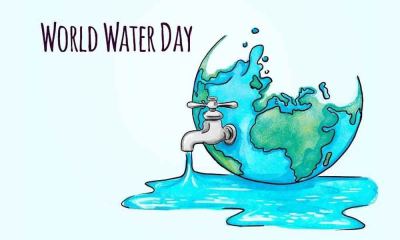
While World Water Day (March 22) is a celebration of an invaluable resource, it is also a stark reminder of the need to conserve it and ensure everyone has access to it.
Water, water everywhere, but…
Given the number of waterbodies on Earth and their vastness, water shouldn't be a concern for us, right? Well, despite covering more than two-thirds of our planet, most of these waterbodies about 97 %-are oceans, meaning it's all saltwater, which we cannot use. Not all of the remaining 3% of freshwater is available to us either because much of it is trapped in glaciers, icebergs, etc. Which is why we have very little freshwater globally from rain and rivers. While climate change-induced global warming is the cause of a lot of our water problems today, poor global water management too is a reason that many people do not have access to clean water. And it is this aspect that this year’s World Water Day seeks to draw our attention to water and sanitation crisis.
What is water and sanitation crisis?
Most of us have access to clean water-all we have to do is just open a tap (at home at school, and at most places we may travel to). But this is not a common scenario for everyone in the world. In some countries, and even in many places in our own country, people do not have access to clean water. According to the UN, 1 person out of 10 does not have access to safe water, and 1 out of 4 lacks access to a toilet. Especially in rural areas and dry regions, people-invariably women and girls – walk afar (often trudging for hours) to fetch pots of water for drinking, cooking, and bathing. This very act can steal several hours a day from them, denying women time for themselves or time that can be used for income-generating work to empower themselves. Children could end up not having time to go to school, costing them their education, and may not have time for playing either. In fact, travelling to remote places to fetch water can put women and children in unsafe places, endangering them. And, when water becomes a luxury, priority is likely to be accorded to drinking, cooking, etc., leaving very little to be used for bathing, washing, etc. When residential houses do not have toilets, people may resort to open defecation, which could lead to health concerns Also, if schools do not have toilets, girls may choose to skip school, particularly during menstruation. Further, if the water available is not safe or clean enough for use, it could lead to disease, if the only earning member of a less privileged family loses their livelihood or life to a disease, it could trigger the collapse of that entire family.
The focus this year
The focus of 2023's World Water Day is on "accelerating change to solve the water and sanitation crisis". This is also closely linked to U.N.'s Sustainable Development Goal No. 6-"Clean Water and Sanitation”. To take this message across to everyone globally, the UN has launched "Be The Change", a campaign that "encourages people to take action in their own lives to change the way they use, consume and manage water”. It helps us see how small actions matter (see box below). While it is important for governments the world over to initiate steps at international and national levels to conserve water, each of us, irrespective of our age or gender, has it in us to make a difference When we are judicious with the use of our resources, including water, everyone may have access to that resource, quietly ensuring equity in our world.
Picture Credit : Google




